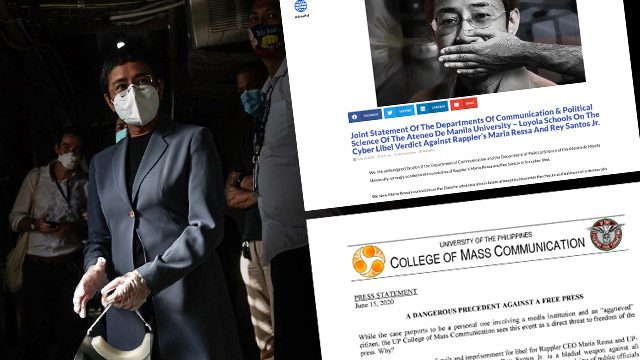SUMMARY
This is AI generated summarization, which may have errors. For context, always refer to the full article.

MANILA, Philippines – Academic institutions showed solidarity and pointed out how the verdict is more than just about the conviction of Rappler CEO and Executive Editor Maria Ressa and former Rappler researcher-writer Reynaldo Santos Jr.
Manila Regional Trial Court Branch 46 Judge Rainelda Estacio-Montesa ruled Ressa and Santos guilty of cyber libel charges on Monday, June 15.
The cyber libel case stemmed from Santos’ May 2012 article on the late former chief justice Renato Corona’s links to businessmen, including Wilfredo Keng, who disputed parts of the article that quoted an intelligence report linking him to drugs and human trafficking. (TIMELINE: Rappler’s cyber libel case)
For the University of the Philippines College of Mass Communication (UP-CMC), the guilty verdict is not just an attack against all journalists, but against all Filipinos on social media exposing the corruption and wrongdoing of public officials online.
A threat to all
“This is not a threat to media alone. More important, it is a bladed weapon poised to cut and bleed out any journalist, any writer, or any Filipino social media user, who posts criticisms of public acts of corruption and incompetence on the internet,” UP-CMC said in a statement.
Although the article was published in 2012, Keng only filed a complaint in 2017, beyond the one-year prescription period for libel under the Revised Penal Code. The article in question was also published 4 months before the enactment of the cybercrime law in September 2012, sparking questions about retroactivity.
UP CMC said that “the judge’s decision, if not corrected by the Supreme Court, has – in one fell swoop – eliminated the one-year prescriptive period of libel and created a new, strange abomination: the theory of ‘continuing publication.’”
“The State can prosecute even after 10, 12, or more years after publication or posting. It is a concept of eternal threat of punishment without any limit in time and cyberspace,” it continued.
The Department of Justice had used the theory of republication to justify the article’s coverage in the cybercrime law after Rappler corrected a typographical error on February 19, 2014, belatedly spotting the misspelled “evation” and changing it to “evasion.”
An attack to destroy accountability
In a joint statement of the Departments of Communication and Political Science of the Ateneo de Manila University-Loyola Schools, the guilty verdict is another blow by the Duterte administration to dismantle the checks and balances of a democratic society.
It’s been more than a month since the ABS-CBN shutdown. Both departments said the guilty verdict on Ressa and Santos is part of the government’s “long-standing, concerted effort to go after its most ardent and public critics.”
“This sends a chilling message to all our citizens: the Duterte administration offers no safe harbor for those who criticize it,” it said in a statement.
Misplaced resources?
They also lambasted the government for going after groups and institutions critical of the government instead of just focusing its efforts on combating COVID-19 and responding to the economic hardships brought about by the pandemic.
“It seems to us that the current administration is most animated and proactive when looking for ways to intimidate and silence critics, while it seems so inept and reactive when Filipinos demand efficient and pro-people solutions to the current pandemic crisis,” it stressed.
If the government can exhaust its resources to silence known personalities and institutions in the media, both Ateneo departments expressed its worry over ordinary Filipino citizens who voice out their dissent online.
It added that accountability would not be possible without a free press and active citizenry and highlighted the importance of journalism to the country’s democracy
“As educators, we cannot allow ourselves to be mere spectators to the injustices that are unfolding right before our very eyes. This verdict, together with the myriad issues that this government has brought upon the Filipino people, strengthens our commitment to the formation of ethical, critical, and competent students,” it said.
Meanwhile, various youth groups and student organizations also slammed the guilty verdict and expressed their support for Ressa and Santos. – Rappler.com
Add a comment
How does this make you feel?
There are no comments yet. Add your comment to start the conversation.